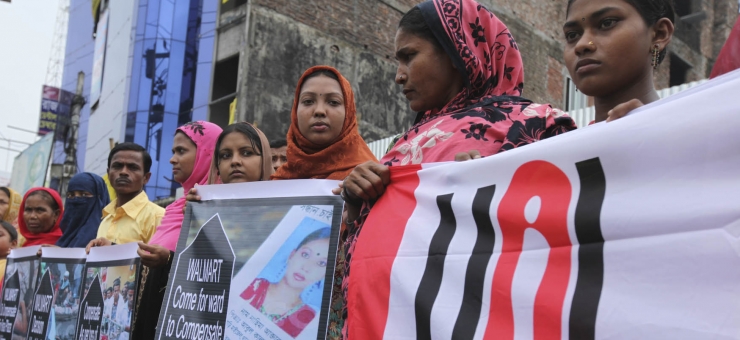Bangladesh Accord marks second anniversary

Garment industry in Bangladesh on the way to become safe
Two years ago in May 2013, global garment brands and retailers and 2 global unions and their national RMG affiliates signed an unprecedented agreement to make garment factories safe in Bangladesh. With more than 200 company signatories and 1500 factories covered by the agreement, the Accord is embarked on a large scale effort to identify and resolve all major safety risks in these factories.
The Accord has acted immediately in cases where inspections found safety problems which posed imminent danger to workers’ lives. In all factories, the signatories and factories are developing and implementing Corrective Action Plans to remediate all identified safety hazards. What is now underway is the enormous task of actually fixing the safety concerns at all inspected factories and building effective worker-management safety committees in all Accord supplier factories.
To date, all 1500-plus factories covered under the Accord have been inspected for fire, electrical and structural safety. Many safety issues were identified at each Accord inspected factory. “Fixing all these hazards is a massive amount of work for the RMG industry, but safety remediation work at the inspected factories is underway. There has been especially good progress on electrical remediation which is positive as most factory fires are caused by electrical hazards. As a result, we have helped prevent fires in factories covered by the Accord,” says Brad Loewen, Chief Safety Inspector of the Accord. “We are pleased to also report that we have verified the first fully remediated factories where all fire, electrical, and structural safety corrective actions from the initial inspections are complete.”
The initial inspections by the Accord have brought the urgency to improve workplace safety in the Bangladeshi RMG to the fore. “Identifying the issues and developing plans to correct them is the first step. In the 3 remaining years of the Accord we will work with our signatories and suppliers to complete the remediation at all factories and ensure that a functioning safety and health committee capable of maintaining and monitoring safety issues on a day-to day basis is in place at every Accord listed factory. This requires a concerted effort from the factories with support from the Accord signatory companies and Accord union colleagues. The Accord team stands ready to support all parties if we hit obstacles in this road ahead.” says Rob Wayss, Executive Director of the Accord.
The Accord continues to work intensively with our company and union signatories, workers, factory owners and their associations and the Government of Bangladesh - National Effort to realize the common goal of a safe and sustainable RMG industry in Bangladesh. Good progress has been made, more needs to be done, and the Accord remains focused to ensure all we have committed to do becomes the reality for the RMG workers and the RMG industry in Bangladesh.
For more information:
Accord Office Dhaka:
+88 02 9852093
Mahafuza Akter, Communications Officer- 01766695926
For press outside Bangladesh:
Joris Oldenziel, Head of Public Affairs and Stakeholder Engagement
Office Amsterdam: +31 (0) 20 520 7431
Mobile: +31 614954430
ABOUT THE ACCORD
The Accord is an independent, legally binding agreement between garment brands and trade unions designed to work towards a safe and healthy Bangladeshi Ready-Made Garment Industry. Our purpose is to enable a working environment in which no worker needs to fear fires, building collapses, or other accidents that could be prevented with reasonable health and safety measures.
Features of the agreement
#1 – a five year legally binding agreement between brands and trade unions to enable a safe working environment in the Bangladeshi garment industry.
#2 – an independent inspections program enabled by brands, in which workers and trade unions are involved.
#3 – a reporting system of transparent publication of all inspection reports and Corrective Action Plans.
#4 – a commitment by the industry to financially supporting remediation where necessary.
#5 – an extensive training and worker empowerment program.
#6—the installation of health and safety committees in all Accord factories.

